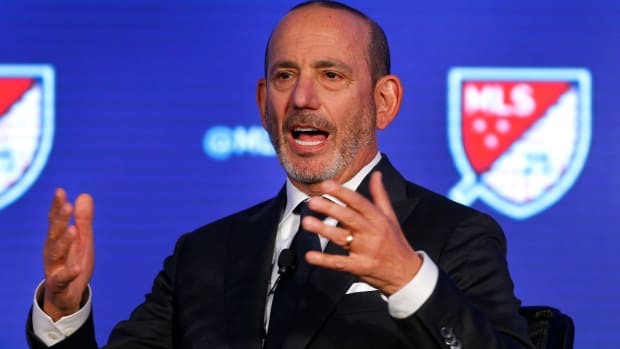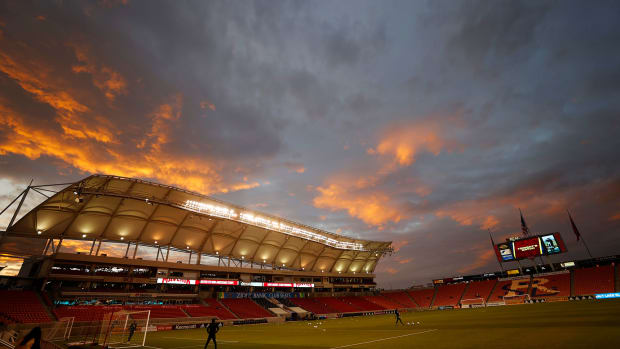Don Garber explained the scope of the financial losses suffered as a result of the pandemic and looked forward in his annual address.
A year that was supposed to be a sustained celebration of MLS’s 25th season quickly turned into one of trauma—commissioner Don Garber used the word “traumatic” around a half-dozen times during Tuesday’s State of the League address and press conference—economic hardship and historic resilience.
Like most businesses, MLS suffered because of the coronavirus pandemic. But it also persisted, staging the innovative MLS is Back Tournament inside an Orlando bubble before returning to home markets in August and finishing out most of the rest of the regular season. The MLS Cup playoffs have progressed relatively smoothly by comparison, and they’ll conclude Saturday night when the Columbus Crew host the reigning champion Seattle Sounders in the MLS Cup final at Mapfre Stadium.
Garber said Tuesday that MLS was able stage 97% of its scheduled regular season matches and was the only league in the world to return to play in a bubble then complete a regular season and playoff schedule in home markets. That achievement didn’t come without cost, however. The commissioner reiterated that the league suffered a nearly-$1 billion decline in year-over-year revenue, requiring significant cost cuts, including the recent layoff of 20% of the league’s front-office staff.
“Actually the impact of all this is probably deeper than what we expected, and that is concerning to us,” Garber said. “But our owners have been understanding this impact from the very beginning. We are concerned about what this will look like leading into 2021, and are working as I’m sure everybody can imagine on figuring out how we could manage through that. I am very very hopeful that 2021 will be way better than 2020, because I don’t think any business could sustain the kind of impact that we sustained in 2020 for two years in a row.”
Among the anticipated 2021 developments are the launch of expansion team Austin FC, the opening of new, soccer-specific stadiums in Columbus and Cincinnati (plus Austin) and the potential return of fans to league venues. Discussion of those plans were among the highlights of Garber’s annual address.
Here are the key takeaways from Tuesday:

MLS focuses on March start despite pandemic uncertainty
Garber said Tuesday that the league still is targeting “an early- to mid-March opening” for next season, even as it “reviews different models and time frames” as potential alternatives. As much as MLS would like to welcome fans back, both for revenue and atmosphere, the pandemic’s unpredictability makes it impossible to connect the season’s kickoff to their return.
“Nobody has that magic date right? And it will vary state by state, and province by province, so we need to make a schedule for all the reason that you would expect,” Garber said regarding the potential timing of fans’ return.
“We can’t wait for an understanding of the impact of the vaccine,” he said. “We’re not going to know that, and we have to set a schedule prior to that. We’re also not going to know what reaction fans have to returning to stadiums, so just the idea that the vaccine is available does not give us an indication as to when fans will be returning to stadiums.”
Calendar concerns, the like scheduling of FIFA international windows and Concacaf competitions, also limit the amount of flexibility the league has. It can’t just wait and react.
“We’re trying to play as many games as possible because it’s not just about fans. It’s about, are we going to be able to retain as much of our sponsor and media revenue,” Garber asked. “So we obviously have a lot of work to do. What we can do to say here today is [we’re] evaluating this as we speak. We will continue to do that. We understand we’re going to need some flexibility but we’re not going to be able to wait to make a decision until somebody decides that fans will be able to attend stadiums. That is a date that is so uncertain at this point.”
The pandemic did contribute to a readjustment of the league’s expansion calendar. It was previously announced that the league will play with 27 teams next year as Austin enters the Western Conference, giving it 13 members while the East sticks with 14. Charlotte FC then will kick off in 2022, followed by Sacramento Republic and St. Louis City in 2023.
Financial issues will persist
In addition to the revenue shortfall, MLS was forced to incur expenses it couldn’t anticipate when it finalized a new collective bargaining agreement with the players over the winter. The resulting impact on the bottom line was significant.
“We chartered players to every game. That’s not currently part of our CBA. We had the expense of managing the MLS is Back Tournament, and while that was able to allow us to capture some revenue, the expenses of housing so many players and operating those games and creating the virtual stadiums were enormous,” Garber said.
“The losses have been traumatic,” he added, indicating that the way forward like would focus on cost control.
“Right now our teams have been able to manage through it through their own equity infusions and their own ability to put debt on their clubs up to the limit that we have established for our teams, as all leagues do. We have not expanded the debt limit for our teams at this point,” Garber explained.
“There are different groups that have come together … looking to make minority equity investments in teams. We’ve met with all of them to see if those possibilities exist,” he revealed. “But at this point, which is what our challenge is, our need to manage the losses to adjustments that we’r making to our operating expenses is something we can control far better than we’re able to control our ability to seek funding on the outside market.”
He referenced the layoffs at league and club level and the 5% pay cut accepted by the players among the “many other things that we have to do in order to manage our cash flowed and ensure that we can remain strong and viable. … We will work hard, as we’ve done in the past, to make adjustments to our spending. That’s challenging and frankly traumatic to the system.”
One piece of potential good news is that Garber doesn’t think the pandemic will negatively impact the league’s next media/TV rights deal, which will commence in 2023.
“We have time to be able to rebuild all of the excitement and momentum on that front,” he said, while claiming that overall ratings “have held up at a time when other sports ratings, for the most part, have decreased.”

Real Salt Lake sale hasn’t progressed, but league has no plans to move the club
Real Salt Lake, along with the rest of Dell Loy Hansen’s Utah soccer empire, including Rio Tinto Stadium, have been for sale since scandal engulfed the disgraced owner this summer. One piece, the NWSL’s Utah Royals, already has been broken off and sold to owners in Kansas City. Garber confirmed Tuesday, however, that RSL shouldn’t suffer a similar fate. Although Salt Lake City is only the country’s 47th-most populous metro area, Garber said it’s been a good market for soccer and that the league intends to stay there.
“[There’s] a passionate fan base. They’ve had on-field success and continue to have that success over time in a small market. There is absolutely no plan whatsoever to move that team. There are interested parties in discussion with us about buying [Hansen’s] interest in the club and in the [USL Championship’s] Monarchs,” Garber said. “Discussions continue to be ongoing and frankly productive.”
Although Hansen has been the point person for the sale, the league has the right to assume control of the process after a certain period has elapsed. Garber said Tuesday that he anticipates MLS stepping in and doing just that, and that at an announcement is likely “within the next 30 days.”
He added that the league’s investigation into Hansen’s conduct at RSL, among other issues at Utah Soccer Holdings, has concluded and that the findings will be revealed following the MLS Cup final.
The factors behind the RSL sale notwithstanding, Garber said the transfer of clubs at this point in the league’s evolution isn’t something to be concerned about. Orlando City owner Flavio da Silva also has signaled his intention to divest.
“So much of MLS has been new owners coming in to new teams and expanding the footprint of MLS in the United States and Canada, and in other leagues—where they’re almost entirely for the most part expanded—when you see [owners] trade their existing teams, we’ve had very little of that over our 25 years,” Garber said. “I think you’ll start seeing that more and more in time, and that’s natural and to be expected. It doesn’t concern me in any case when an owner has decided for whatever personal reasons that they’re looking to sell their team.”
Garber said conversations concerning an Orlando City sale “continue to happen,” but that no deal is expected “in the near future.” Garber said Da Silva remains committed to operating the club, which includes an NWSL team, in the meantime.